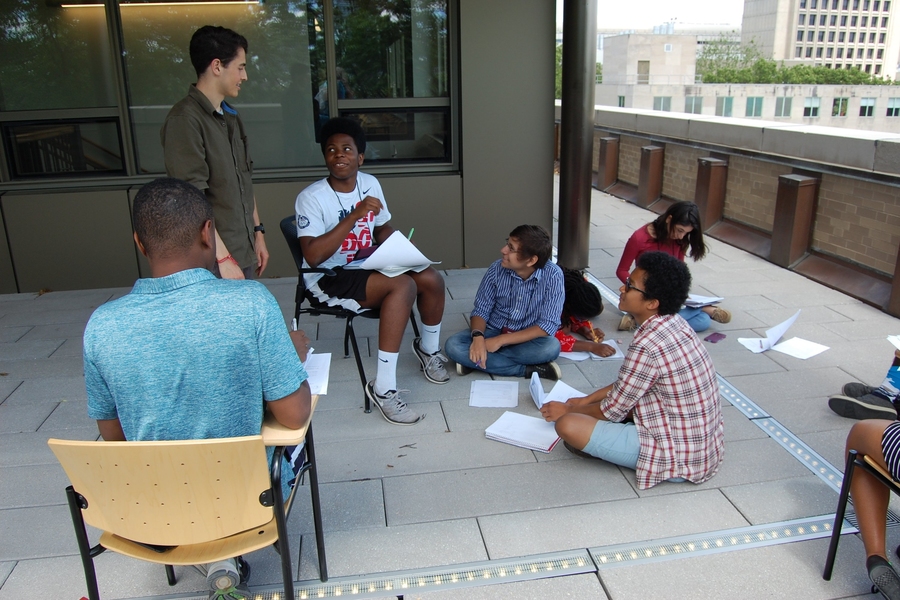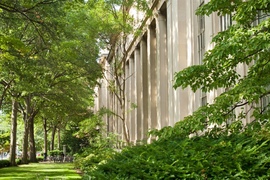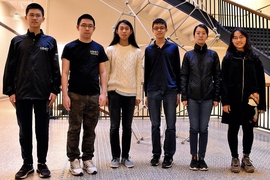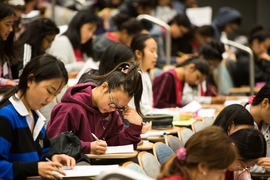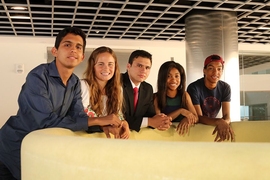As the MIT community moved to remote learning in response to the Covid-19 pandemic, a math outreach program was moving online — and developing a project to allow high schoolers to help research the disease.
The Program for Research in Mathematics, Engineering and Science (PRIMES) pairs high school students with MIT graduate students and postdocs to investigate unsolved problems in mathematics, computer science, and computational biology.
This year, one of those unsolved problems is Covid-19. MIT mathematics doctoral candidate Younhun Kim has already signed up to mentor two high school juniors as they research mathematical modeling of SARS-CoV-2 host protein interactions.
"This was a late addition to our program," says PRIMES director and Department of Mathematics Lecturer Slava Gerovitch. "As we were moving our PRIMES program online to promote social distancing, we also decided to view the pandemic as an intellectual challenge. We hope that this project may contribute valuable Covid-19 research." This project and others will culminate in a presentation at the PRIMES conference in October and, hopefully, a submitted publication in December.
Recently, the American Mathematical Society (AMS) announced that the MIT Department of Mathematics was selected for the 2020 Award for Exemplary Program or Achievement in a Mathematics Department. The award, given annually to “a department that has distinguished itself by undertaking an unusual or particularly effective program of value to the mathematics community, internally or in relation to the rest of society,” honors the PRIMES program. PRIMES also recently received an AMS Epsilon grant, for rigorous summer programs for mathematically talented youth.
Conceived by Gerovitch and mathematics Professor Pavel Etingof in 2010, MIT PRIMES is a free outreach program for high school students with a particular focus on increasing the representation of women and under-served minorities in mathematics research. The program’s goal is “to allow students to discover the beauty of being a research mathematician,” according to Etingof.
With seed money from the mathematics department, the program initially sought out local students to spend an entire year to create mathematical and computer models that address real-world problems, such as cancer, internet security, traffic control, autonomous driving, refugee migration, brain research, laser engineering, and now Covid-19, among many others.
“We were initially afraid that we wouldn’t get enough applications for the 10 slots,” says Gerovitch. “We ended up with 100 applications, many of which were very strong, and we decided to double the initial size of the program.”
What started out as an experiment with just 21 local participants grew more than fivefold in 10 years. Since 2011, over 600 students have participated in the various MIT PRIMES and MathROOTS programs, and more than 130 PRIMES alumni have matriculated at MIT.
Over the years, the PRIMES initiative has expanded into sub-programs that target different student audiences, nationally and internationally. Each is designed to build collaborative teams with mathematics members to promote partnership and wider outreach in the mathematical sciences community.
"It is very gratifying that our outreach efforts are recognized by AMS," says Michel Goemans, head of the mathematics department. "It is an important part of our educational activities, which not only gets young students interested in mathematics but is also an enriching experience for our many graduate student mentors."
In 2013, the initial PRIMES program added PRIMES-USA, offering long-distance mentoring for high school juniors nationwide, and PRIMES Circle for Boston-area high school students from underserved groups and underserved communities. Affiliate program PRIMES STEP (which stands for Solve, Theorize, Explore, and Prove) is open to Boston-area middle schoolers interested in after-school math enrichment. PRIMES also assisted the National Centre of Competence in Research "The Mathematics of Physics — SwissMAP” with PRIMES-Switzerland, a guided math reading program at the University of Geneva and ETH in Zürich.
After the success of these programs, the MIT mathematics department launched MathROOTS in 2015, an outreach initiative to encourage diversity at the high school level. This free annual two-week math summer camp aims to engage its 20 U.S.-based participants in creative problem-solving, expose them to beautiful yet accessible mathematics, and immerse them in an academic and cross-cultural community of scholars. Participants also attend fun group activities, such as a Red Sox game, swing dancing, and a talent show.
“MathROOTS has proven remarkably successful, not only in empowering students to take on more challenging and engaging mathematics, but also drawing many to more seriously consider applying to MIT and other top schools,” says Etingof. “This is at the crux of what diversity outreach is all about.”
Now entering its sixth summer, MathROOTS is adapting to the realities of social distancing by transitioning online. Students will meet their peers and mentors via Zoom, but the program will not lose its fun and engaging spirit. Math-infused games, virtual tours of MIT and Boston, Massachusetts sights, and extensive social programming will complement online math lectures and problem-solving sessions.
PRIMES’ shift online is not new to the organizers. “PRIMES is an ongoing experiment in different research formats,” says Gerovitch. “For many of our students and mentors, the transition to online learning and research was made easier due to the experience gained in remote research supervision in PRIMES-USA and CrowdMath.” CrowdMath is a platform that has been employed for years to enable massive collaboration between high school and college students around the globe on a single research project, moderated by PRIMES mentors. “The entire PRIMES program is run remotely now, and the projects are moving forward at full speed,” he says.
"There is something special about having mentors who are excited to teach, students that are excited to learn, and a group of people who want to share the 'Aha!' moments of clarity and understanding with each other," says former PRIMES Circle student Makena Binker Cosen. "My experience in MIT PRIMES Circle has allowed me to appreciate mathematics from a new perspective and become fascinated by how beautifully simple a complex idea can become."
